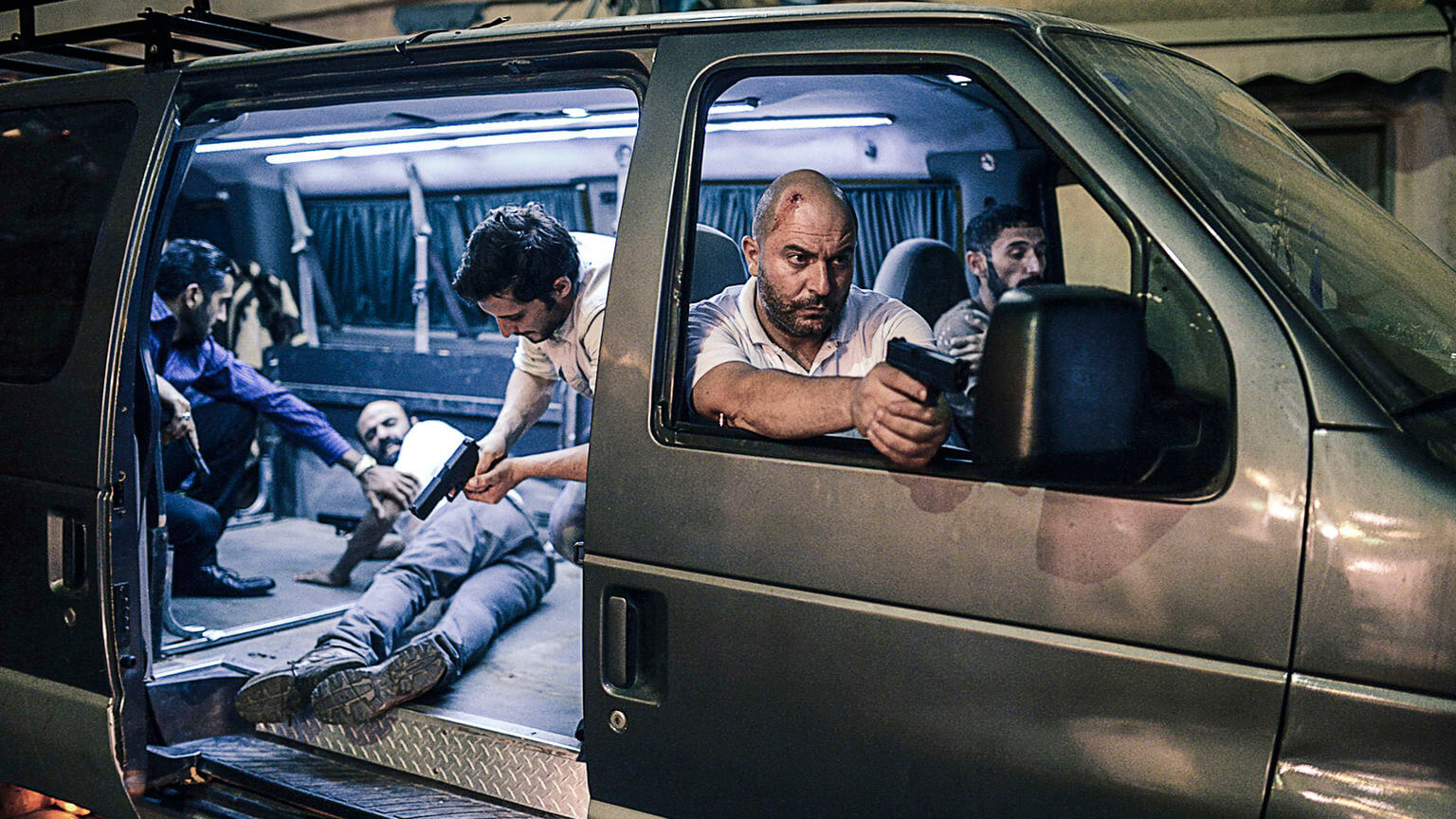‘Fauda’ nearly predicted a terrorist invasion of Israel — the show’s creators thought it was too far-fetched
‘Fauda’ co-creator Avi Issacharoff on the Israel-Gaza war and his rescue mission with Lior Raz

The forthcoming season of Fauda was almost a lot like what’s happening in Israel right now. Courtesy of Netflix
When Avi Issaccharoff, journalist and co-creator of Fauda, was workshopping stories for the upcoming fifth season of the thriller, one idea was for hundreds of militants to breach Israel’s border and take control of a village.
“We found that it’s way, way too much,” Issacharoff said over the phone from Tel Aviv. “Fauda tries to be authentic and realistic. If you come up with something like that, it sounds crazy. So we gave it up. And then, Saturday morning, we saw something way, way, way worse than what we tried to imagine.”
By Monday, Issaccharoff and his Fauda co-creator Lior Raz were in a real war zone, visiting the area around Sderot in Southern Israel, where Hamas militants went on a shooting rampage over the weekend. Video shows Issacharoff and Raz, along with former Knesset member and Israel Democracy Institute President Yohannan Plesner, dodging rocket fire as they worked to escort two families to safety.
Accompanied by Yohanan Plesner @yplesner and Avi @issacharoff , I headed down south to join hundreds of brave "brothers in arms" volunteers who worked tirelessly to assist the population in the south of Israel. We were sent to the bombarded town of Sderot to extract 2 families pic.twitter.com/WpM9JLeOZM
— Lior Raz (@lioraz) October 9, 2023
The truth of the situation in Israel is more shocking than any fiction, and took Issacharoff, The Times of Israel’s Middle East analyst, by complete surprise, prompting him to call Oct. 7 Israel’s 9/11.
I spoke with Issacharoff Tuesday about his evacuation, misconceptions about Gaza and what this war means for the region. The following conversation has been edited for length and clarity.
Where were you when this all started? How did you first hear? Was it rockets?
6:30 a.m. in the morning on Saturday in Tel Aviv, my daughter, who heard the sirens, woke me up because I was asleep — very deep asleep. And I think that both of us didn’t really get what’s going on, and then immediately we saw the reports from all over the southern border. I didn’t think that this is what’s going to happen, with hundreds of militants crossing the border, kidnapping, killing, massacring, et cetera. And every minute that passed by it just got worse and worse and worse.
You’ve met Hamas’ leadership. You’re familiar with how they operate. So this wasn’t something that you expected from them.
No, no, they never operated on such a large scale, such a wide scale. They never had an operation of hundreds of militants attacking at the same time simultaneously, 23 different points on the border with Israel. That’s the first time ever. It seems like they’ve been proving that their military capability is way, way beyond what we imagined. But I think that they succeeded too much in a way — meaning it’s a kind of a Pyrrhic victory or Pyrrhic win.
In terms of what the retaliation will be?
What’s the bottom line? What’s the mission? What’s the aim? When you go to a mission like that, you need to ask yourself, “What is my aim?”
So I guess that they wanted to kill many Israelis and to kidnap a few. But they succeeded way, way more than we expected. I don’t think that they imagined that they can kidnap 150 people into Gaza and kill almost 1,000 Israelis.
Basically it did two things. On the Israeli level, in the Israeli public, it made everyone feel that we have the right now to go and eliminate each and every Hamas man, woman, whatever — just to eliminate Hamas.
The other thing is that in the international media and international public opinion, they are perceived right now as ISIS. Even the West is now giving the legitimacy to Israel to go wild against Gaza and against Hamas.
Can you tell me a little bit about this operation in Sderot. I saw that you were there with Lior Raz. How did you end up there and what was the scene like?
There’s an organization that is called “Brothers in Arms,” Achim Laneshek in Hebrew. I’m very familiar with what they do because of the demonstrations against Netanyahu’s government. I took a very active part in them. And I love this organization, and I heard that this organization has a kind of operation room in the south helping people.
So I went there yesterday around noon, and I met hundreds of people that came there in order to volunteer, to help to facilitate the transferring of residents of the outskirts of Gaza from that area into a safer zone — people that don’t have cars, people that do not feel secure enough to go with the car outside of their house. So we came there with our private cars.
We escorted them, and we brought them out into the safety zone. So this is where Lior, my friend and partner, joined me, together with Yohanan Plesner, and we did a couple of rounds to the Sderot area. We were under rocket attacks, of course. I also experienced a shooting incident right outside my car. But we ended up safely at the end of the day.
Thank God for that. Now we’re gearing up for the troops going in. You have sympathy for the people of Gaza, but what is the general temperature in terms of what the response is going to be?
I think most Israelis understand that there’s going to be a very long war now coming, and it’s not going to last for a day or two, but it’s going to last for a few weeks. And it’s going to be terrible, with a very heavy price for both sides. But we have to do it. We were pushed to the corner in the most terrible way that one can imagine, and we will need to show the people that have done it that that was their biggest mistake ever.

How do you think that this is going to change the dynamics of the region? Do you think that Hezbollah might get involved? What do you make of this beyond these two sides?
I think that it really depends on the outcome of this war and if we will manage to bring down Hamas’ government and regime, that’s going to be a very strong clear message to the rest of the region.
Hezbollah is already now trying to kind of play around the border. Just now, while we are talking, there are some rockets and missiles that were shot from Lebanon by Hezbollah against Israel, but it’s not a large-scale escalation with Hezbollah. I think that it would be very stupid for Hezbollah to join the war now.
Is there anything Americans should know about the situation that you think maybe is being missed in our coverage?
I think that for more than 10 years, that’s kind of a myth that everyone just bought, and ate, and chewed and swallowed that there’s a siege over Gaza. You know, because one can imagine that the Israelis were blocking Gaza from everything — a real siege, not allowing anyone to get outside of Gaza, not allowing electricity, water, people.
In the last, I would say, nine years, with the blessing of our government, with a clear political direction from Prime Minister Netanyahu, Gaza’s situation improved economically. Meaning, first of all, there’s no siege, OK? There was electricity, water coming from Israel. In the last year and a half or two years, Israel allowed 18,500 workers from Gaza to come to Israel and to work here. I’ve met people outside my house in Tel Aviv that were from Gaza.
I assume that for the first time now, we are going to witness a real siege, meaning the Israeli government yesterday decided to put a real siege over Gaza, but one should understand that there was no siege and still Hamas was doing what it is doing. Now we will see Israel blocking electricity, water, workers, money, everything. It’s going to be stopped. And I think that that will see a very tough result in Gaza.
A message from our Publisher & CEO Rachel Fishman Feddersen

I hope you appreciated this article. Before you go, I’d like to ask you to please support the Forward’s award-winning, nonprofit journalism so that we can be prepared for whatever news 2025 brings.
At a time when other newsrooms are closing or cutting back, the Forward has removed its paywall and invested additional resources to report on the ground from Israel and around the U.S. on the impact of the war, rising antisemitism and polarized discourse.
Readers like you make it all possible. Support our work by becoming a Forward Member and connect with our journalism and your community.
— Rachel Fishman Feddersen, Publisher and CEO





























